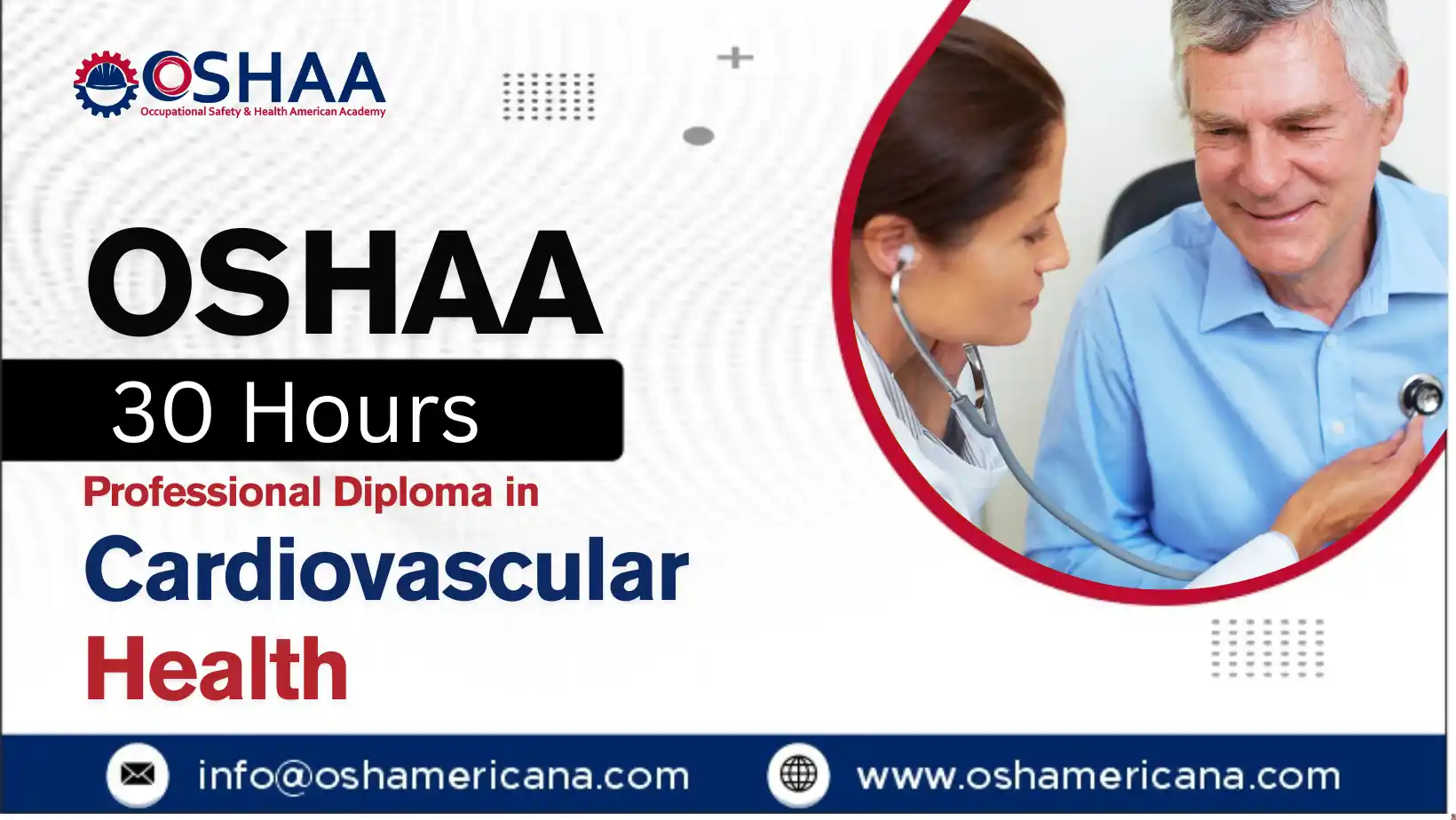The OSHAA 30-Hours Professional Diploma in Cardiovascular Health is designed to equip healthcare professionals with the essential knowledge and applied understanding required to manage and prevent cardiovascular diseases in diverse populations. This diploma provides a comprehensive exploration of heart health, risk factors, preventive strategies, and patient-centred care models, reflecting UK professional healthcare standards.
With cardiovascular disease remaining one of the leading causes of death globally, there is an increasing demand for professionals who can implement evidence-based approaches in both clinical and community settings. This diploma addresses those needs with a curriculum that blends theoretical understanding with real-world application.
Participants will explore the anatomy and physiology of the cardiovascular system, learn to interpret clinical presentations, and develop strategies to support individuals at risk or living with cardiovascular conditions. Emphasis is placed on early intervention, health promotion, and integrated care.
By completing this course, participants will be better prepared to deliver cardiovascular health education, support behavioural change, and contribute to the reduction of heart-related morbidity and mortality in their communities. The diploma also enhances professional development and aligns with CPD requirements for those in nursing, allied health, and public health roles.
This qualification is ideal for participants aiming to advance their careers in cardiology, preventative health, or chronic disease management. Delivered in a flexible format, the course is structured to fit around busy professional schedules while offering practical and immediately applicable insights.
OSHAA 30-Hours Professional Diploma in Cardiovascular Health
Study Units
Learning Outcomes
Anatomy and Physiology of the Cardiovascular System (3 hours)
- Identify the major structures and functions of the heart and blood vessels
- Explain the physiological processes involved in blood circulation and cardiac output
- Understand how cardiovascular function impacts overall systemic health
Risk Factors, Prevention, and Lifestyle Interventions (4 hours)
- Recognise modifiable and non-modifiable cardiovascular risk factors
- Apply evidence-based strategies for prevention and early intervention
- Support behaviour change through diet, physical activity, and health education
Hypertension and Atherosclerosis: Pathophysiology and Management (4 hours)
- Describe the mechanisms and progression of hypertension and atherosclerosis
- Interpret clinical indicators for diagnosis and management planning
- Support treatment adherence through monitoring and patient-centred care
Heart Failure: Recognition, Monitoring and Support (3 hours)
- Identify signs and symptoms of acute and chronic heart failure
- Understand common monitoring techniques and intervention options
- Provide supportive care for individuals with heart failure in clinical settings
Cardiac Arrhythmias and ECG Interpretation Basics (4 hours)
- Recognise common types of arrhythmias and their clinical presentations
- Understand basic principles of ECG interpretation
- Contribute to timely referral and safe monitoring practices
Cholesterol, Obesity and Metabolic Syndrome in Cardiovascular Health (3 hours)
- Explain the role of dyslipidaemia, obesity, and metabolic syndrome in cardiac disease
- Promote nutritional and lifestyle strategies to manage these conditions
- Understand pharmacological and non-pharmacological interventions
Smoking, Alcohol and Substance Use in Heart Disease (5 hours)
- Assess the cardiovascular impact of tobacco, alcohol, and recreational drugs
- Implement strategies for cessation support and harm reduction
- Understand the role of community and policy interventions in prevention
Mental Health, Stress and Cardiovascular Risk (4 hours)
- Explore the links between psychological health and cardiovascular outcomes
- Recognise stress-related behaviours and physiological responses
- Support holistic care that integrates emotional wellbeing in cardiac health management
Course Benefits of the OSHAA 30-Hours Professional Diploma in Cardiovascular Health
- Enhances understanding of the cardiovascular system and related diseases from a clinical and preventative perspective
- Equips participants with the skills to identify and manage key cardiovascular risk factors in diverse populations
- Builds competence in interpreting early signs of heart disease, hypertension, arrhythmias, and cardiac emergencies
- Develops evidence-based knowledge in health promotion, lifestyle modification, and patient education
- Supports participants in integrating mental health and stress management strategies into cardiovascular care
- Strengthens capacity for interdisciplinary collaboration in both primary and secondary healthcare settings
- Increases awareness of the role of nutrition, obesity management, and substance use in cardiovascular health
- Prepares participants to contribute effectively to community health initiatives and rehabilitation programmes
- Recognised CPD qualification that supports career advancement in nursing, allied health, public health, and clinical care
- Offers a flexible and accessible learning format suitable for both healthcare professionals and those entering the field of cardiac health management
The OSHAA 30-Hours Professional Diploma in Cardiovascular Health is designed for participants seeking to enhance their knowledge and skills in the prevention, recognition, and management of cardiovascular conditions. It is ideal for:
- Healthcare professionals, including nurses, paramedics, and allied health staff involved in cardiac care
- Public health practitioners and health educators focused on community health and wellness
- Fitness and wellness professionals interested in cardiovascular risk reduction and lifestyle intervention
- Individuals working in rehabilitation centres, aged care, or chronic disease management settings
- Participants aiming to pursue roles in cardiovascular support services or clinical assistance
- Anyone with a professional or personal interest in promoting heart health through evidence-based practices
This diploma offers a solid foundation for those committed to improving outcomes in cardiovascular health through a multidisciplinary, preventive, and patient-centred approach.







